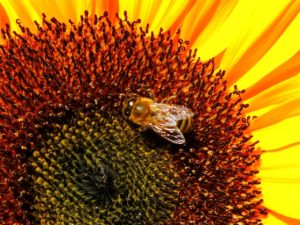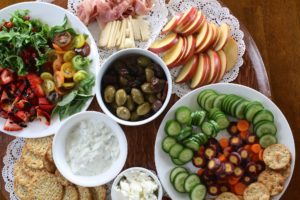How can you enjoy National Pollinator Week, June 20- 26, 2016? Eat some great food!
National Pollinator Week is a time to celebrate pollinators and spread the word about what you can do to protect them. The Pollinator Partnership has great information about Pollinator Week, “a celebration of the valuable ecosystem service provided by bees, birds, butterflies, bats and beetles.”
 If pollination ensures a bountiful food supply, what foods are we talking about? Five major crops rely heavily upon insect pollination: almonds, apples, blueberries, melons and squash. Some additional foods produced with the help of pollinators include: strawberries, chocolate, peaches, figs, cucumbers and tomatoes. In addition to those fruits, vegetables and nuts, there are other crops that rely on pollinators. Alfalfa is pollinated by insects and is a staple food in a cow’s diet. From the cow, we enjoy milk as a beverage as well as cheese and yogurt. Sunflower and canola plants require pollination for their seeds and/or oil for cooking.
If pollination ensures a bountiful food supply, what foods are we talking about? Five major crops rely heavily upon insect pollination: almonds, apples, blueberries, melons and squash. Some additional foods produced with the help of pollinators include: strawberries, chocolate, peaches, figs, cucumbers and tomatoes. In addition to those fruits, vegetables and nuts, there are other crops that rely on pollinators. Alfalfa is pollinated by insects and is a staple food in a cow’s diet. From the cow, we enjoy milk as a beverage as well as cheese and yogurt. Sunflower and canola plants require pollination for their seeds and/or oil for cooking.
In 2016, Ohio was one of eight states that trained teen leaders through 4-H Youth Development to facilitate a Honey Bee Challenge, teaching youth to learn about science, honey bees and their role in pollination. This STEM (science, technology, engineering and math) activity included bee bots (mini-robots) and glitter “pollen” sprinkled on a map of a farm showing rows of cucumbers, melons, sunflowers, blueberries and apples.
 Thirty-five percent of all crop production requires insect pollination. Another way to look at it is that one out of every three bites we eat requires insects. To celebrate Pollinator Week, consider using the pollinator friendly meal ideas list(PDF). This menu was created in 2007 but still offers a tasty selection of foods including the following courses: appetizers, vegetarian entrees, entrees, dessert and cocktails/drinks. For Pollinator Week I might prepare a cheese platter with dried figs, a fresh salad with a rainbow of vegetables, almond encrusted fish, vanilla ice cream with berries and tea. What are your favorite pollinated foods? Plan to enjoy some next week! #Bee sure to use #pollinatorweek on your social media posts to share how you are celebrating #pollinators.
Thirty-five percent of all crop production requires insect pollination. Another way to look at it is that one out of every three bites we eat requires insects. To celebrate Pollinator Week, consider using the pollinator friendly meal ideas list(PDF). This menu was created in 2007 but still offers a tasty selection of foods including the following courses: appetizers, vegetarian entrees, entrees, dessert and cocktails/drinks. For Pollinator Week I might prepare a cheese platter with dried figs, a fresh salad with a rainbow of vegetables, almond encrusted fish, vanilla ice cream with berries and tea. What are your favorite pollinated foods? Plan to enjoy some next week! #Bee sure to use #pollinatorweek on your social media posts to share how you are celebrating #pollinators.
